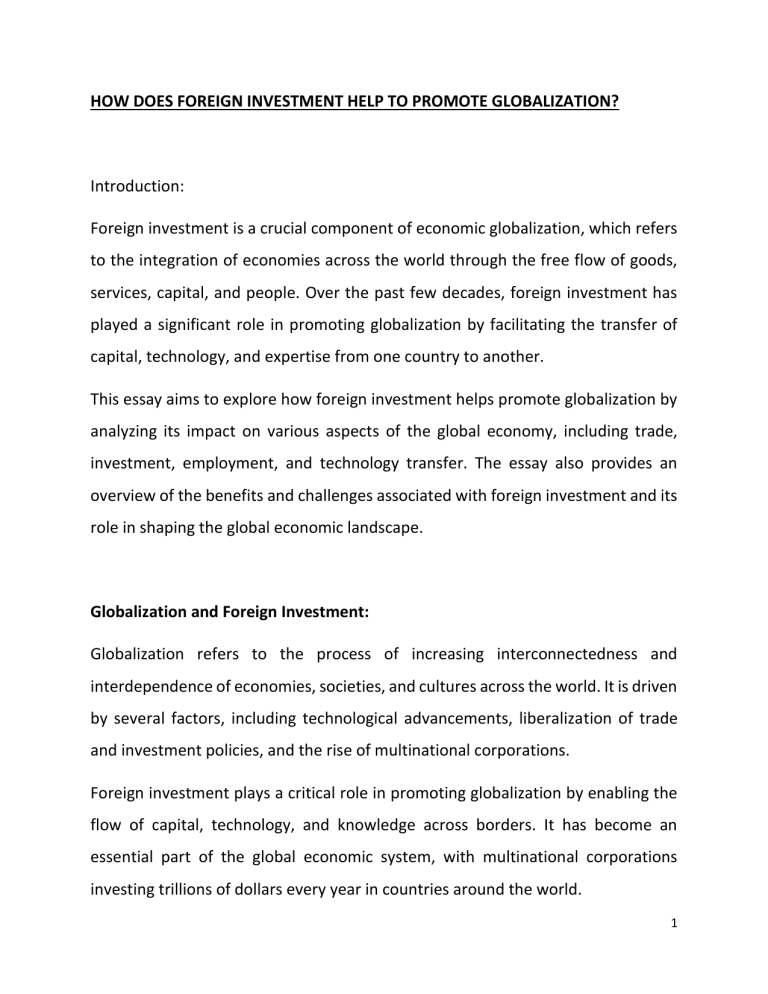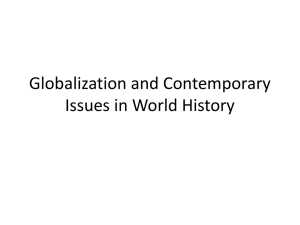
HOW DOES FOREIGN INVESTMENT HELP TO PROMOTE GLOBALIZATION? Introduction: Foreign investment is a crucial component of economic globalization, which refers to the integration of economies across the world through the free flow of goods, services, capital, and people. Over the past few decades, foreign investment has played a significant role in promoting globalization by facilitating the transfer of capital, technology, and expertise from one country to another. This essay aims to explore how foreign investment helps promote globalization by analyzing its impact on various aspects of the global economy, including trade, investment, employment, and technology transfer. The essay also provides an overview of the benefits and challenges associated with foreign investment and its role in shaping the global economic landscape. Globalization and Foreign Investment: Globalization refers to the process of increasing interconnectedness and interdependence of economies, societies, and cultures across the world. It is driven by several factors, including technological advancements, liberalization of trade and investment policies, and the rise of multinational corporations. Foreign investment plays a critical role in promoting globalization by enabling the flow of capital, technology, and knowledge across borders. It has become an essential part of the global economic system, with multinational corporations investing trillions of dollars every year in countries around the world. 1 Foreign investment can take many forms, including foreign direct investment (FDI), portfolio investment, and cross-border mergers and acquisitions (M&A). FDI involves the establishment of a new business operation or the acquisition of an existing one in a foreign country. Portfolio investment, on the other hand, involves the purchase of stocks, bonds, and other financial assets in foreign companies. Cross-border M&A involves the merger or acquisition of companies across national borders. The Impact of Foreign Investment on Globalization: Foreign investment has a significant impact on various aspects of the global economy, including trade, investment, employment, and technology transfer. Trade: Foreign investment promotes globalization by enhancing trade flows between countries. Multinational corporations that engage in FDI often establish supply chains that span across different countries. This leads to the creation of intra-firm trade, whereby goods and services are traded between different subsidiaries of the same company. Foreign investment also contributes to the growth of international trade by increasing competition in local markets. Multinational corporations often bring new products, technologies, and business practices that can improve the efficiency and competitiveness of local firms. This results in increased exports and imports, leading to greater economic integration among countries. 2 Investment: Foreign investment promotes globalization by facilitating the flow of capital from developed to developing countries. FDI provides a source of long-term financing that can help developing countries overcome their capital constraints and promote economic growth. Foreign investment also contributes to the development of financial markets in developing countries by introducing new financial instruments, such as bonds and shares, that can help mobilize domestic savings and attract foreign investment. Employment: Foreign investment promotes globalization by creating jobs in developing countries. Multinational corporations that engage in FDI often provide employment opportunities for local workers, which can help reduce unemployment and poverty. Foreign investment also contributes to the development of human capital in developing countries by providing training and knowledge transfer to local workers. This can help improve the skills and productivity of the local workforce, leading to higher wages and better working conditions. Technology Transfer: Foreign investment promotes globalization by facilitating the transfer of technology and knowledge from developed to developing countries. Multinational 3 corporations that engage in FDI often bring new technologies, business practices, and managerial expertise that can help improve the efficiency and competitiveness of local firms. Foreign investment also contributes to the development of research and development (R&D) activities in developing countries by establishing R&D centers and collaborating with local universities and research institutes. This can help promote innovation and technological advancement in developing countries, leading to the creation of new industries and jobs. Benefits of Foreign Investment on Globalization: Foreign investment has several benefits for developing countries, including: Access to capital: Foreign investment provides a source of long-term financing that can help developing countries overcome their capital constraints and promote economic growth. Job creation: Foreign investment creates employment opportunities for local workers, reducing unemployment and poverty. Technology transfer: Foreign investment facilitates the transfer of technology and knowledge from developed to developing countries, promoting innovation and technological advancement in developing countries. Export promotion: Foreign investment enhances trade flows between countries, leading to increased exports and imports and greater economic integration. 4 Improved infrastructure: Foreign investment often involves the establishment of new infrastructure, such as factories, ports, and transportation networks, which can improve the efficiency and competitiveness of local firms. Challenges of Foreign Investment on Globalization: Foreign investment also has several challenges for developing countries, including: Dependency: Developing countries can become overly dependent on foreign investment, making them vulnerable to external shocks and market fluctuations. Volatility: Foreign investment is often volatile, with investors pulling out their investments during times of economic uncertainty or political instability. Environmental and social impact: Foreign investment can have negative environmental and social impacts, such as land grabbing. 5




